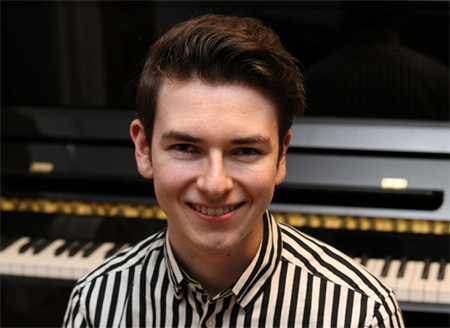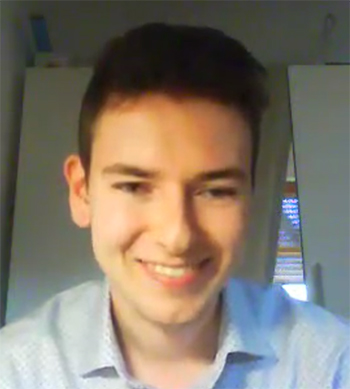by Daniel Hathaway

Aumiller, 22, earned his bachelor’s degree summa cum laude from the Conservatorio F. A. Bonporti in Trento, Italy, and went on to complete a graduate diploma at Juilliard under Sergei Babayan. He’s currently working on a master’s degree with Babayan at the Cleveland Institute of Music.
I reached him in his hometown of Munich for a Skype conversation, and began by asking him what his life has been like since everything fell apart in March.
“I was still in Cleveland when the pandemic started in Germany, then I decided pretty quickly to leave America as I was afraid they would close the border, which they did.” But luckily, not before Aumiller had booked a flight back home.
In the weeks that followed, the young pianist found plenty to occupy his time. “I had a couple of online lessons, and I’ve been practicing and learning a couple of new pieces. I finally got to read some books which I had wanted to do for a long time. In school when we had to study all those famous German poems and dramas, I wasn’t really interested. I was probably too young to understand them. But I had all those books in the library here in my room so I decided, why not read now. I actually enjoyed it quite a bit.”
Aumiller was also preparing for the Cleveland competition, which required a trip to the Steinway Gallery in Hamburg to video record a 20-minute and a 30 to 35-minute program. “It was kind of strange,” he said. “I hadn’t played in public for three months, and of course my inspiration to practice wasn’t the highest. It was a little bit awkward to get back into it.”
The pianist also found it difficult to perform to an artistic manager and two camera operators instead of a live audience. “I need the feeling of connection and the energy that an audience always gives. Some things happened that I wasn’t too happy about, but overall it was OK.”
And how did he decide what to play, given the time restrictions and only the rubric that his selections should be different in style? “I chose pieces I like very much and have a close connection to. And there are a couple that we rarely get to hear.”
Those include Busoni’s rather extravagant arrangement of Bach’s D-Major Prelude and Fugue, BWV 532, and the Italian-German composer’s own Toccata in A-flat Minor. Aumiller, who was a finalist in the 2019 Ferruccio Busoni International Piano Competition (Bolzano, Italy), admires the way that Busoni imitated the sound of the organ in the Bach transcription: “He transcribed the idea of how the piece would sound in a big cathedral.” Busoni also brings the mysterious third pedal of the piano into play.
Aumiller said he really got interested in organ literature in the last year and a half. “It’s a very different sound experience for a pianist, but I think the repertory is genius.” Noting that there are few piano arrangements of organ works, he has transcribed two of Mendelssohn’s six Organ Sonatas, and his second round program begins with the finale of No. 6.

Aumiller has been fundamentally changed by his studies with Babayan in New York and Cleveland. “When I came to him I thought I was already a pianist, and I knew how to play, but it turns out I was certainly not. He showed me what I still have to learn. He is the biggest inspiration I can imagine, both as a musician and a person. The way he understands music, plays music, and lives music. Being able to study with him is probably the luckiest thing that’s happened in my life so far.”
When he’s not reading Schiller and practicing Busoni, Jonas Aumiller said he enjoys getting out into nature and taking walks with friends both in Munich and Cleveland. “I also like movies quite a lot, and I have to admit that I also spend plenty of time with my phone!”
Responding to my hypothetical dinner party question — who would he invite to guarantee scintillating conversation, and what German dish would be on the table? — Aumiller noted that he does like German food, “but it has a lot of fat and meat, and might not be to everybody’s taste.” As for guests, No. 1 would be Johann Sebastian Bach, “because he is the father of almost all the music we have today, and is so down to earth and approachable as a human being. And he’d probably appreciate the German cuisine.”
Guest No. 2 would be Sergei Babayan, “who loves Bach even more than I do, and it would be interesting to have those great minds together.” The third guest would be Rachmaninoff. “I admire him as a genius pianist and composer.”
And does Aumiller have some questions he’d personally want to put to Bach? “I’d like to ask him where his music comes from. How it’s possible to find a fugue subject that you can combine with itself to make diminutions, augmentations, strettos, even a canon for six voices. That’s beyond imagination. Is it just practice, does he have some secret, or is it a God-given talent?”
On Thursday, we speak with Priscila Navarro.
Published on ClevelandClassical.com July 29, 2020.
Click here for a printable copy of this article


